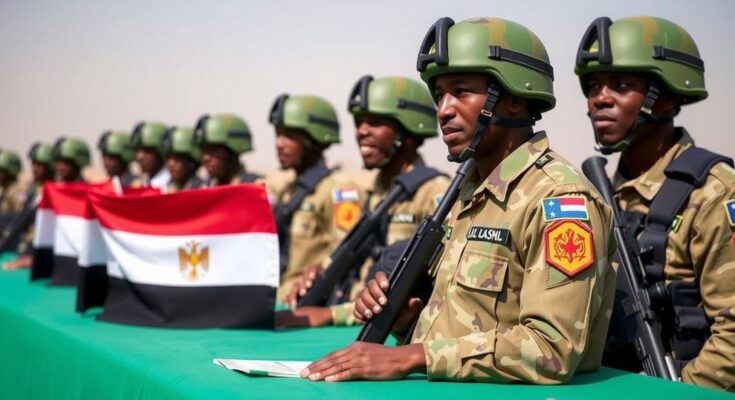Egypt’s Foreign Minister announced the country’s upcoming participation in a new African Union peacekeeping force in Somalia, responding to a request from the Somali government. The involvement signifies a strategic partnership amid rising tensions with Ethiopia following a maritime deal with Somaliland. The transition from ATMIS to AUSSOM will focus on combating Al-Shabaab insurgents. Egypt reaffirms support for Somalia’s sovereignty and looks to enhance regional alliances.
On Monday, Egypt’s Foreign Minister Badr Abdelatty announced the nation’s commitment to participating in a newly established African Union peacekeeping force in Somalia. This decision comes as a response to a formal request from the Somali government, as well as the endorsement from the African Union Peace and Security Council. The announcement was made during a joint press conference with Somali Foreign Minister Ahmed Moalim Fiqi in Cairo, further highlighting the strengthening ties between Egypt and Somalia amidst rising tensions with Ethiopia.
The regional context influencing this decision includes recent developments in the Horn of Africa, particularly following Ethiopia’s signing of a maritime agreement with Somaliland in January, which has contributed to escalating hostilities in the region. The impending conclusion of the African Union Transition Mission in Somalia (ATMIS) on December 31 has prompted the establishment of the African Union Support and Stabilization Mission in Somalia (AUSSOM), aimed at combating the Al-Shabaab insurgency.
Minister Abdelatty reaffirmed Somalia’s territorial integrity, stating his country’s rejection of any actions undermining Somalia’s sovereignty, unity, and security. This month marked a significant diplomatic maneuver by Turkey, facilitating a resolution to the prolonged discord between Somalia and Ethiopia, which has received praise from various international entities, including the African Union, Washington, and Brussels. Despite earlier statements excluding Ethiopian troops from the new peacekeeping force, Somalia has welcomed Egypt’s involvement in this mission.
While the specifics regarding Egypt’s participation in the force remain vague, there are indications of a strategic partnership developing between Egypt and Somalia. Notably, in August, Egypt formalized a military cooperation agreement with Somalia, coinciding with the visit of Somali President Hassan Sheikh Mohamud to Cairo. Furthermore, a summit in Asmara in October involving Egypt, Eritrea, and Somalia also indicated a growing alliance designed to position these nations in opposition to Ethiopia, particularly regarding disputes over the Grand Ethiopian Renaissance Dam on the Blue Nile, which Egypt contends threatens its essential water resources.
The announcement regarding Egypt’s involvement in the new AU peacekeeping force in Somalia emerges in a context fraught with geopolitical tensions in the Horn of Africa. Recently, Ethiopia’s maritime deal with Somaliland has exacerbated strains with Somalia, leading Cairo to bolster its alliances within the region. The transition from the ATMIS to the AUSSOM is a pivotal moment aimed at ensuring stability against the Al-Shabaab threat while promoting African cooperation and security. Notably, Turkey’s role in mediating between Somalia and Ethiopia represents a shift in regional dynamics, showcasing the complexities of these inter-state relationships. The historical context of Egypt’s water security concerns over the Blue Nile plays a crucial role in the motivations behind these recent developments, determining Egypt’s strategic interests in Somalia and broader Horn of Africa policies.
In summary, Egypt’s decision to participate in the new AU peacekeeping force in Somalia is a strategic response to evolving regional dynamics and the need for stability amid unrest linked to Ethiopia. With a focus on enhancing cooperation and bolstering Somalia’s sovereignty, Egypt’s involvement signals a commitment to regional security. The diplomatic engagements, including cooperation agreements and summits, highlight a potential shift in alliances aimed at counteracting Ethiopian influence and ensuring a collective security framework within the region.
Original Source: www.barrons.com




